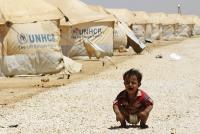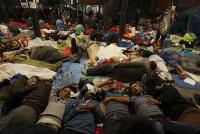-
Tech companies: weakening encryption would only help the bad guys
Leading technology companies — Apple, Microsoft, Google, Samsung, Twitter, Facebook, and fifty-six other technology companies — have joined forces to campaign against weakening end-to-end encryption, insisting that any weakening of encryption would be “exploited by the bad guys.” Apple’s chief executive Tim Cook recently asserted that “any backdoor is a backdoor for everyone.”
-
-
After Paris, it’s traditional detective work that will keep us safe, not mass surveillance
Before the dust has even settled from the attacks on Paris, familiar calls for greater surveillance powers are surfacing. The desire for greater security is understandable, but that doesn’t mean we should suspend our judgement on the measures proposed to bring it about. It’s widely accepted that intelligence work is the most effective form of counter-terrorism, and that the best intelligence comes from community engagement, not coercion. So we must be wary of the evangelism of those pushing technological solutions to security problems, and the political clamor for mass surveillance.
-
-
Turkey shoots down Russian war plane over Turkey
In a significant escalation of tension along the Syrian-Turkish border, Turkish military aircraft earlier Tuesday shot down a Russian jet after the jet violated Turkey’s airspace. The Turkish announcement said that despite repeated warnings from Turkish F-16 interceptors to turn away, the Russia jet continued to fly over Turkish territory. The incident is a reminder of the growing risks in the increasingly crowded skies over Syria, where planes from the United States, the U.S.-led coalition, Russia, the Syrian air force, France, and, soon, the United Kingdom pursue different missions without a great deal of coordination.
-
-
Bringing matters to a head in Syria
The growing tensions among the major players in Syria is reflection of the different strategic interests of these plays. Iran and Russia would cooperate with the United States in fighting ISIS — but only as part of a strategy to keep the Alawite Assad in power and prevent the Sunni majority from coming to power in Syria. The leading Sunni states have given mostly lip-service to the need to fight ISIS, because Sunnis are not going seriously to fight the fellow Sunnis of ISIS, despicable as they are, unless that campaign is part of a broader strategy to remove Assad and the Alawites from power in Syria, reduce Iran’s influence in Syria and Lebanon, turn Syria into a country run by its Sunni majority, and protect the interests of Iraq’s Sunnis. ISIS is the result — the ugly, deadly result — of growing Sunni grievances since the 2003 U.S. invasion of Iraq. ISIS can be defeated militarily, and it will be defeated, but unless Sunni grievances — in Iraq, in Syria, in Palestine — are effectively addressed, the removal of ISIS from the stage would merely be a prelude to the emrengence of the next ISIS-like group.
-
-
ISIS “trying to obtain chemical, nuclear weapons”: U.K. government
British prime minister David Cameron said yesterday that the government security review has warned that ISIS and al-Qaeda are trying to get their hands on chemical and nuclear weapons. Cameroon referred to the security review in a speech in which he called on Members of Parliament to approve U.K. air strikes in Syria within a week. The British government pledged allocation additional resources for new equipment and the creation of within the Army of two new rapid response “strike brigades” of 5,000 soldiers each. The number of civilian jobs in the Ministry of defense, though, will be heavily reduced.
-
-
German terrorist cell planned to attack German-Holland soccer game last Tuesday
Last Tuesday’s friendly soccer game in Hanover between the national teams of Germany and the Netherland was canceled at the last minute after credible information that terrorists were planning to detonate three bombs inside the stadium during the game. BfV, Germany’s domestic intelligence agency, says there are 1,100 Islamists in Germany, of which 420 are classified as high-risk because of their potential to threaten public safety. These Islamists have exhibited a readiness to use violence.
-
-
FBI director, DHS secretary criticize House Syrian refugee bill

FBI director James Comey said he is deeply concerned about a bill which passed the house last week which would require him and other top national security officials personally to certify that each refugee from Syria and Iraq whose application for asylum in the United States is accepted, is not a security threat. DHS secretary Jeh Johnson echoed Comey’s criticism.
-
-
Napolitano, Chertoff: it is possible to welcome Syrian refugees, protect U.S. security

Two former secretaries of the Department of Homeland Security — Janet Napolitano (2009-13) and Michael Chertoff (2005-9) — wrote to President Barack Obama Thursday, saying it is possible to welcome refugees while ensuring the safety and security of Americans. “The [vetting] process that is currently in place is thorough and robust and, so long as it is fully implemented and not diluted, it will allow us to safely admit the most vulnerable refugees while protecting the American people. Fortunately, these goals are not mutually exclusive,” the two former secretaries write.
-
-
DHS seeking faculty, students for summer 2016 research programs
The U.S. Department of Homeland Security (DHS) is seeking faculty, undergraduate, and graduate students interested in participating in one of its 10-week programs in summer 2016, including its Summer Research Team Program for Minority Serving Institutions and its Homeland Security — Science, Technology, Engineering and Mathematics (HS-STEM) Summer Internship Program. The deadlines for applying for both programs occur in December 2015.
-
-
170 hostages held in Mali’s capital
About ten gunmen, reported to be speaking English, early Friday morning stormed and took control over a luxury hotel in Bamako, Mali’s capital. Reports from the Mali security forces and hotel guests speak of three people who were killed and about 170 being held hostage by the terrorists. About eighty guests managed to leave the hotel – they either escaped, or were released by the attackers after proving they were Muslim by citing passages from the Quran.
-
-
House votes for an effective ban on Syrian refugees coming to U.S.
The House of Representatives on Thursday overwhelmingly approved a bill which slows down, if not blocks altogether, the resettlement in United States of refugees from Syria and Iraq. Breaking with their president, dozens of Democrats joined all the Republicans present to pass a bill which requires the directors of the FBI and national intelligence personally to approve the acceptance into the United States of each refugee.
-
-
Trump: Muslim Americans may be required to carry special ID noting their religion
Donald Trump said he would not rule out entering all Muslim Americans in a database or giving them “a special form of identification that noted their religion.” Trump told the interviewer that he would consider warrantless searches of Muslims and increased surveillance of mosques. “We’re going to have to do things that were frankly unthinkable a year ago,” Trump said.
-
-
Encryption firm tightens access following Paris attacks
Encrypted communications specialist Silent Circle, after learning that ISIS was recommending two of the company’s products — the encrypted Blackphone handset and Silent Phone applications for private messaging — to the organization’s followers, is taking steps to make it more difficult for terrorists and their followers to use these products.
-
-
Telegram IM app recalibrates policies after Paris attacks
Pavel Durov, the creator of the popular instant messaging app Telegram, has said that following the Paris terrorist attacks, his company has blocked dozens of accounts associated with the jihadist Islamic State group. As is the case with other technology companies, Telegram is trying to negotiate the balance between privacy and security: the same privacy-enhancing technology which keeps customers’ communication private, also helps terrorists communicate with each other and plot attacks safe from monitoring and surveillance by intelligence agencies and law enforcement.
-
-
“Iconic” El Niño may bring more than rain to California
A few weeks ago in the hills north of Los Angeles, heavy rain set off widespread mudslides that blocked roads and covered highways, burying hundreds of vehicles and bringing much of Los Angeles’ infamous traffic to a standstill. For Californians, these mudslides are just one of many recent harbingers signaling the imminent arrival of a “monster” El Niño — an El Niño that started bubbling up from unusually warm temperatures in the tropical Pacific last summer. In Southern California, a strong El Niño usually signals rain, and given that California is now in the throes of a severe drought, it seems like that should be a good thing, even if it comes with risk of floods. But the reality of climate is more complex and counter-intuitive than it first appears, and Californians should be careful what they wish for.
-
More headlines
The long view
Factories First: Winning the Drone War Before It Starts
Wars are won by factories before they are won on the battlefield,Martin C. Feldmann writes, noting that the United States lacks the manufacturing depth for the coming drone age. Rectifying this situation “will take far more than procurement tweaks,” Feldmann writes. “It demands a national-level, wartime-scale industrial mobilization.”
No Nation Is an Island: The Dangers of Modern U.S. Isolationism
The resurgence of isolationist sentiment in American politics is understandable but misguided. While the desire to refocus on domestic renewal is justified, retreating from the world will not bring the security, prosperity, or sovereignty that its proponents promise. On the contrary, it invites instability, diminishes U.S. influence, and erodes the democratic order the U.S. helped forge.
Fragmented by Design: USAID’s Dismantling and the Future of American Foreign Aid
The Trump administration launched an aggressive restructuring of U.S. foreign aid, effectively dismantling the United States Agency for International Development (USAID). The humanitarian and geopolitical fallout of the demise of USAID includes shuttered clinics, destroyed food aid, and China’s growing influence in the global south. This new era of American soft power will determine how, and whether, the U.S. continues to lead in global development.
Water Wars: A Historic Agreement Between Mexico and US Is Ramping Up Border Tension
As climate change drives rising temperatures and changes in rainfall, Mexico and the US are in the middle of a conflict over water, putting an additional strain on their relationship. Partly due to constant droughts, Mexico has struggled to maintain its water deliveries for much of the last 25 years, deliveries to which it is obligated by a 1944 water-sharing agreement between the two countries.
How Disastrous Was the Trump-Putin Meeting?
In Alaska, Trump got played by Putin. Therefore, Steven Pifer writes, the European leaders and Zelensky have to “diplomatically offer suggestions to walk Trump back from a position that he does not appear to understand would be bad for Ukraine, bad for Europe, and bad for American interests. And they have to do so without setting off an explosion that could disrupt U.S.-Ukrainian and U.S.-European relations—all to the delight of Putin and the Kremlin.”
How Male Grievance Fuels Radicalization and Extremist Violence
Social extremism is evolving in reach and form. While traditional racial supremacy ideologies remain, contemporary movements are now often fueled by something more personal and emotionally resonant: male grievance.
